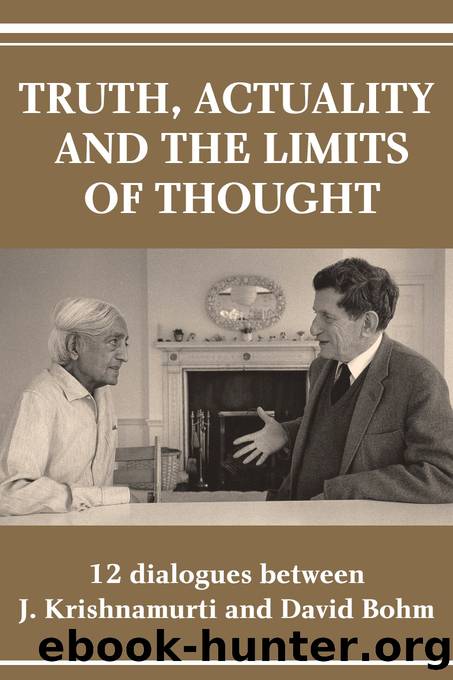Truth, Actuality and the Limits of Thought by Krishnamurti & David Bohm

Author:Krishnamurti & David Bohm [Krishnamurti and David Bohm]
Language: eng
Format: epub
Publisher: Krishnamurti Foundation Trust
Published: 2020-12-05T16:00:00+00:00
EIGHT
DB: I had a letter from David Shainberg and he raised one major question: âIf thought is inherently fragmented and yet thought has to be consciously aware of its own fragmentation, then could we ask whether the thought which is aware of its own fragmentation, is also fragmented?â.
K: Shall we start with that?
DB: Yes...
K: Why do we accept it that thought is fragmented? Why do we say that thought is broken up or has the faculty of breaking up?
DB: I think that weâll have to go deeply into the nature of thought...
K: What is the real, basic reason for thought to be fragmented? Why is thought limited, broken up?
DB: Yes, now Iâve been considering for some time the nature of thought and one point about thought is that it is beginning as a reaction and becoming a reflection. Now, on the basis of memory thought creates an imitation of certain actual things that happen independently of thought. For example, it may imitate in your imagination the appearence of a feeling, or a sound, or something else. Now, it is not possible in a reflection to capture the whole of what is reflected, so there is always an abstraction...
K. Yes, there is always an abstraction, I see that, but you havenât answered my question: why is it fragmented?
DB: Any abstraction is bound to be a fragment, you see?
K: Youâre saying: thought reflects memory...
DB: Yeah... It reflects the content of memory.
K: And therefore, as it reflects, itâs an abstraction.
DB: It doesnât reflect all...
K: ...and therefore itâs fragmentary.
DB: Yes, it selects some things to reflect, and other things are not reflected...
K: Would you put the question this way: Can thought see the whole?
DB: Well, âDoes thought see?â, thatâs another question that David Shainberg raised: âDoes thought actually see anything?â. We discussed the other time in Brockwood that thought can be consciously aware of something, letâs say there is an awareness which involves perception, but everything weâre aware of may go on into memory; is that right?
K: Yes.
DB: Now, when that memory responds, we have thought...
K: Right...
DB: So, as I see it, this conscious awareness is awareness recorded in memory and then reflected, right?
K: Right. So memory is fragmented; therefore, its reflection as thought is fragmented.
DB: The whole experience, for example, is not contained in memoryâthe essence of it may be left out...
K: Left out... I understand. Now, letâs dig deeply into it: why is thought fragmented?
DB: Partly because itâs an abstraction, as youâve just said. I think there is another reason: in some sense, thought is not fully aware of its own operation. Perhaps we can begin this way: the brain has no sense organs to tell itself that itâs thinking.
K: Quite...
DB: You see, if you move your hand, there is a sense organ that tells you that it is moving. If you move your head, the image moves but it is corrected so that the world doesnât spin unless something is wrong with your balance. On the other hand, there are no such sense organs in the brain.
Download
This site does not store any files on its server. We only index and link to content provided by other sites. Please contact the content providers to delete copyright contents if any and email us, we'll remove relevant links or contents immediately.
What's Done in Darkness by Kayla Perrin(25499)
Shot Through the Heart: DI Grace Fisher 2 by Isabelle Grey(18218)
Shot Through the Heart by Mercy Celeste(18160)
The Fifty Shades Trilogy & Grey by E L James(17774)
The 3rd Cycle of the Betrayed Series Collection: Extremely Controversial Historical Thrillers (Betrayed Series Boxed set) by McCray Carolyn(13189)
The Subtle Art of Not Giving a F*ck by Mark Manson(12908)
Scorched Earth by Nick Kyme(11831)
Stepbrother Stories 2 - 21 Taboo Story Collection (Brother Sister Stepbrother Stepsister Taboo Pseudo Incest Family Virgin Creampie Pregnant Forced Pregnancy Breeding) by Roxi Harding(11038)
Drei Generationen auf dem Jakobsweg by Stein Pia(10216)
Suna by Ziefle Pia(10185)
Scythe by Neal Shusterman(9259)
International Relations from the Global South; Worlds of Difference; First Edition by Arlene B. Tickner & Karen Smith(8608)
Successful Proposal Strategies for Small Businesses: Using Knowledge Management ot Win Govenment, Private Sector, and International Contracts 3rd Edition by Robert Frey(8418)
This is Going to Hurt by Adam Kay(7693)
Dirty Filthy Fix: A Fixed Trilogy Novella by Laurelin Paige(6450)
He Loves Me...KNOT by RC Boldt(5804)
How to Make Love to a Negro Without Getting Tired by Dany LaFerrière(5378)
Interdimensional Brothel by F4U(5303)
Thankful For Her by Alexa Riley(5159)
